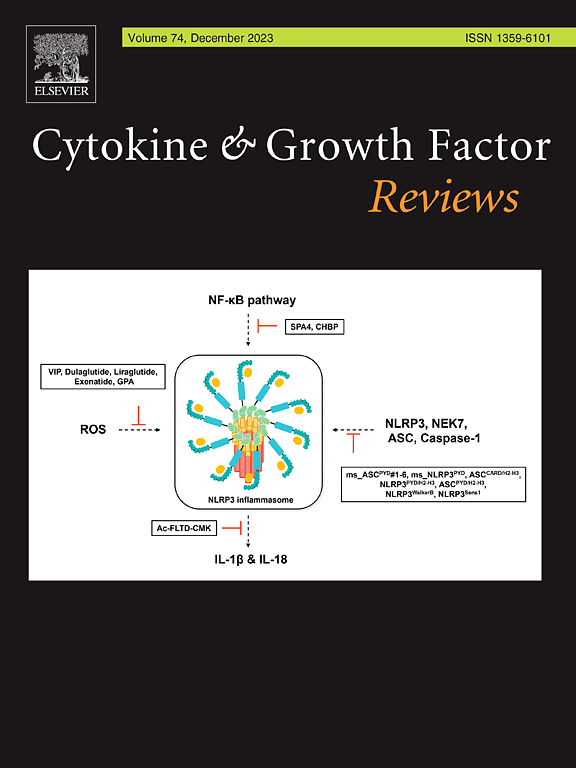Neuro-endocrine-immune regulation of metabolic homeostasis
IF 11.8
2区 医学
Q1 BIOCHEMISTRY & MOLECULAR BIOLOGY
引用次数: 0
Abstract
Metabolic homeostasis, essential for energy balance, is regulated by a highly integrated network involving the nervous, endocrine, and immune systems. While traditional models emphasized endocrine feedback mechanisms and autonomic nervous control, recent evidence reveals extensive cross-talk among these systems, forming a dynamic neuro-endocrine-immune network. The brain coordinates energy balance by integrating signals from peripheral organs, regulating appetite, metabolic rate, and nutrient utilization. Immune responses, particularly in obesity, contribute to metabolic dysfunction through chronic inflammation and cytokine cascades. This review synthesizes the cellular and molecular mechanisms underlying the neuro-endocrine-immune interactions that maintain glucose and energy homeostasis. We describe the functional roles of hypothalamic feeding circuits, peripheral autonomic pathways, adipokines, incretins, and immune cell subsets in metabolic tissues. We also highlight how chronic inflammation, neuroimmune signaling, and hormonal resistance contribute to homeostatic failure. Crucially, we examine emerging therapeutic strategies targeting obesity, type 2 diabetes, metabolic syndrome, and metabolic dysfunction-associated fatty liver disease—approaches that exert multi-system effects by precisely targeting key nodes within this regulatory triad. This integrative perspective not only offers novel paradigms for intervening in complex metabolic disorders but also heralds a future where decoding this network enables personalized medicine to transform clinical practice.
代谢稳态的神经内分泌免疫调节。
代谢稳态对能量平衡至关重要,是由神经、内分泌和免疫系统高度整合的网络调节的。虽然传统模型强调内分泌反馈机制和自主神经控制,但最近的证据表明,这些系统之间存在广泛的串扰,形成了一个动态的神经内分泌免疫网络。大脑通过整合来自外周器官的信号、调节食欲、代谢率和营养利用来协调能量平衡。免疫反应,特别是肥胖,通过慢性炎症和细胞因子级联反应导致代谢功能障碍。本文综述了维持葡萄糖和能量稳态的神经内分泌免疫相互作用的细胞和分子机制。我们描述了下丘脑摄食回路、外周自主神经通路、脂肪因子、肠促胰岛素和代谢组织中的免疫细胞亚群的功能作用。我们还强调了慢性炎症、神经免疫信号和激素抵抗如何导致体内平衡失败。至关重要的是,我们研究了针对肥胖、2型糖尿病、代谢综合征和代谢功能障碍相关的脂肪肝疾病的新兴治疗策略,这些策略通过精确靶向这一调节三元组中的关键节点来发挥多系统作用。这种整合的观点不仅为干预复杂的代谢紊乱提供了新的范例,而且预示着解码这个网络使个性化医疗改变临床实践的未来。
本文章由计算机程序翻译,如有差异,请以英文原文为准。
求助全文
约1分钟内获得全文
求助全文
来源期刊

Cytokine & Growth Factor Reviews
生物-生化与分子生物学
CiteScore
21.10
自引率
1.50%
发文量
61
审稿时长
22 days
期刊介绍:
Cytokine & Growth Factor Reviews is a leading publication that focuses on the dynamic fields of growth factor and cytokine research. Our journal offers a platform for authors to disseminate thought-provoking articles such as critical reviews, state-of-the-art reviews, letters to the editor, and meeting reviews.
We aim to cover important breakthroughs in these rapidly evolving areas, providing valuable insights into the multidisciplinary significance of cytokines and growth factors. Our journal spans various domains including signal transduction, cell growth and differentiation, embryonic development, immunology, tumorigenesis, and clinical medicine.
By publishing cutting-edge research and analysis, we aim to influence the way researchers and experts perceive and understand growth factors and cytokines. We encourage novel expressions of ideas and innovative approaches to organizing content, fostering a stimulating environment for knowledge exchange and scientific advancement.
 求助内容:
求助内容: 应助结果提醒方式:
应助结果提醒方式:


